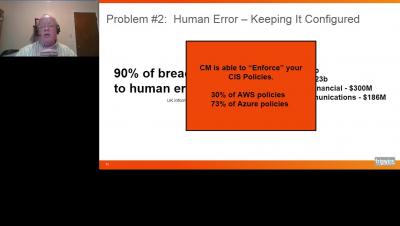Security | Threat Detection | Cyberattacks | DevSecOps | Compliance
Tripwire
Survey: 78% of Retailers Took Additional Security Precautions Ahead of the 2020 Holidays
Coronavirus 2019 (COVID-19) stopped many things in 2020. While in-store holiday shopping may be greatly reduced for some, there’s still a lot of shopping happening online. Near the end of November 2020, Statista revealed that holiday retail sales were expected to grow approximately 3.6% over the previous year. And Adobe Analytics reported that online sales would likely rise 33% to a record $189 billion.
From a Single Pane of Glass, to Functional Dashboards to Manage Cyber Risk
For the longest time, or as far as I can remember, the holy grail of all networking platforms has been the need for a single pane of glass, that single source of all information that you would need to be most effective. So, what is a single pane of glass?
Cloud Security: Messy Blobs and Leaky Buckets
Moving to the cloud means a lot more than just moving your servers and applications to the cloud; it’s also about the data – and data always has a target on it. A lot of IT departments are finding that it’s easier to meet the “five nines” (99.999%) of uptime and availability by going outside their organization and letting AWS, Microsoft, or Google handle the infrastructure and personnel needed to meet those requirements.
8 Key Insights from the 2020 (ISC)2 Cybersecurity Workforce Study
2020 has been a very interesting year for the global workforce, with the vast majority of organizations having to rapidly transition to a remote workforce with little to no prior notice thanks to the COVID-19 pandemic. The 2020 (ISC)2 Cybersecurity Workforce Study looks at the effect of this transition to remote work and how organizations have fared. It also analyzes the impact of the pandemic and the resultant transition to remote work on cybersecurity professionals.
3 Mobile App Security Recommendations for National App Day
On December 11, 2017, Platinum Edge Media and its founder CJ Thompson created National App Day as a way to celebrate how apps have inspired us and changed our culture. The Registrar at National Day Calendar went on to proclaim National App Day to be observed annually. We can’t truly appreciate the impact that apps have on our lives without an idea of how to use these programs securely.
Goodbye to Flash - if you're still running it, uninstall Flash Player now
It’s time to say a final “Goodbye” to Flash. (Or should that be “Good riddance”?) With earlier this week seeing the final scheduled release of Flash Player, Adobe has confirmed that it will no longer be supporting the software after December 31 2020, and will actively block Flash content from running inside Flash Player from January 12 2021.
12 Essential Tips for Keeping Your Email Safe
Hey, did you get that sketchy email? You know, the one from that malicious hacker trying to fool us into clicking on some malware? Boy, these criminals are relentless. Wait, what? You clicked on it? Uh-oh. A hypothetical scenario, but one that plays out every day in organizations across the globe — a very real scenario that provides a good reason to take a deep dive into the topic of email security. Here are some more good reasons.
4 Things a Good Vulnerability Management Policy Should Include
Organizations face an ever-evolving threat landscape. With this in mind, it is imperative that organizations keep an up-to-date vulnerability management policy for remediating and controlling security vulnerabilities that may lead to a breach. A good vulnerability management policy should contain the following.
Key OT Cybersecurity Challenges: Availability, Integrity and Confidentiality
Organisations are still underestimating the risks created by insufficiently secured operational technology (OT). One current example comes from Germany. According to a report by heise.de, external security testers consider it “likely” that a successful serious cyberattack against the publicly owned water company Berliner Wasserbetriebe could lead to a complete failure of the German capital’s waste water management.



